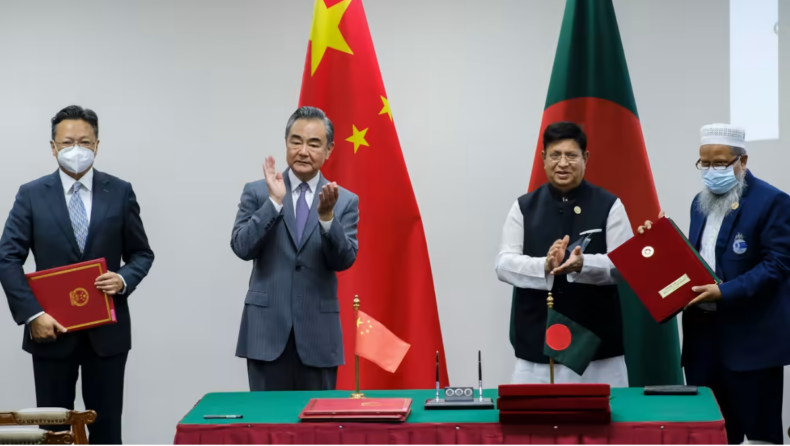Bangladesh sought support from China for repatriating Rohingya refugees to Myanmar during a visit by Foreign Minister Wang Yi. He also gave a word for better trade relations, investments, and support for infrastructural development in this South Asian nation.

China had made use of its influence in Myanmar to mediate a November 2017 agreement for the repatriation of about 700,000 Rohingya Muslim refugees who fled from Myanmar in August that year.
Although attempts are being made to send them back, the refugees are refusing fearing danger in Myanmar. The military takeover of last year has only added to their fears.
Yi arrived in Dhaka on Saturday evening. He met Prime Minister Sheikh Hasina and Foreign Minister A.K. Abdul Momen. Bangladesh’s junior minister of foreign affairs said that they discussed bilateral and global issues before the departure of Yi from Bangladesh.
Bangladesh and China:
Bangladesh enjoys strong relations with China, its major trade partner for raw materials mostly. However, maintaining close ties with China is challenging, as it also tries to balance diplomatic and trade ties with both, the United States and India, the two most important rivals of China.
More than 500 Chinese companies are working actively in Bangladesh. China is a part of all the country’s important infrastructural projects like seaports, river tunnels, and highways. China helped Bangladesh to build the largest bridge over the river Padma for $3.6 billion. In the middle of the recent China-Taiwan tensions, Bangladesh issued a statement reiterating its support for the ‘One China policy. Back in 2008, after winning the elections, Hasina’s administration shut down the Taiwanese business representative office in Dhaka.
This was done as a response to a request from China. After this, the Chinese engagements in Bangladesh have only increased.
The garment industry of Bangladesh, which fetches more than 80% of foreign currency from exports, is heavily relied on China for raw materials.
Visit of Wang Yi:
Ihsanul Karim, the presidential press secretary said that during a courtesy call, Yi told Hasina that China considers Bangladesh as a ‘strategic development partner’ and would continue supporting it.
The United News a Bangladeshi news agency reported that Yi promised to stand beside it on all issues at international forums.
The state-run news agency (Bangladesh Sangbad Sangstha) reported that Hasina has raised global tensions caused by the Russian invasion of Ukraine and Western sanctions against Moscow, saying, “people [across the world] are enduring difficult times … South Asia, Southeast Asia, and China can work together for economic progress.”
Yi agreed to expand trade benefits by raising to 98% duty-free access from the current 97% of Bangladeshi products and services in China’s markets.
Alam said that the new taxes come as good news for Bangladesh. The thriving economy of Bangladesh is based on exports.
He further added that this latest tax advantage will mostly include garments as well as woven and other products that previously faced some barriers. China will soon send a list of products and services to Bangladesh that would get duty-free access.
Bangladesh, China, and the Rohingyas:

The junior minister that China has pledged to work continuously for resolving the Rohingya crisis. Yi said that the internal challenges of Myanmar are troubling not only Bangladesh but also other countries.
READ MORE: Afghan feminists find the decline of women’s rights under the Taliban administration “depressing”












